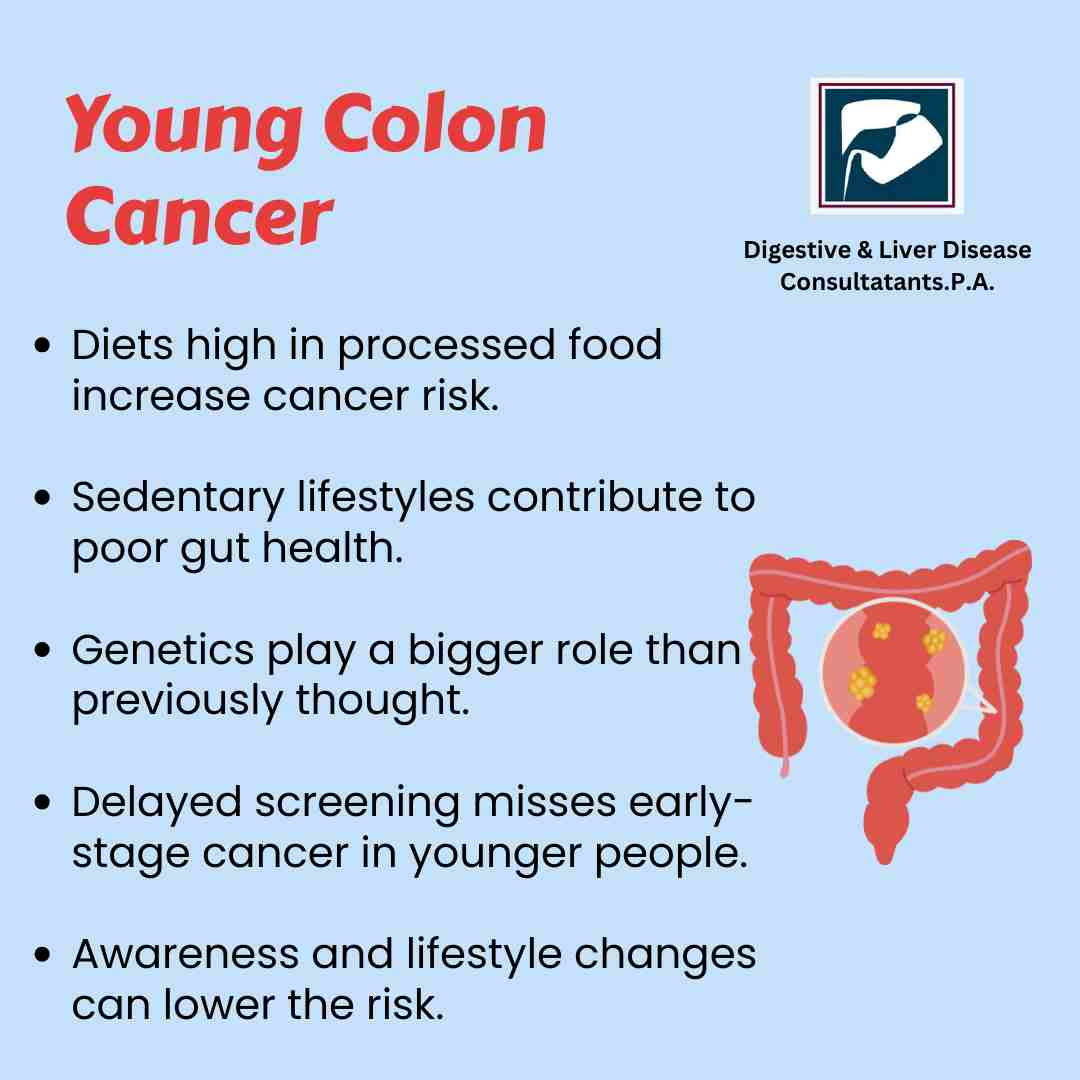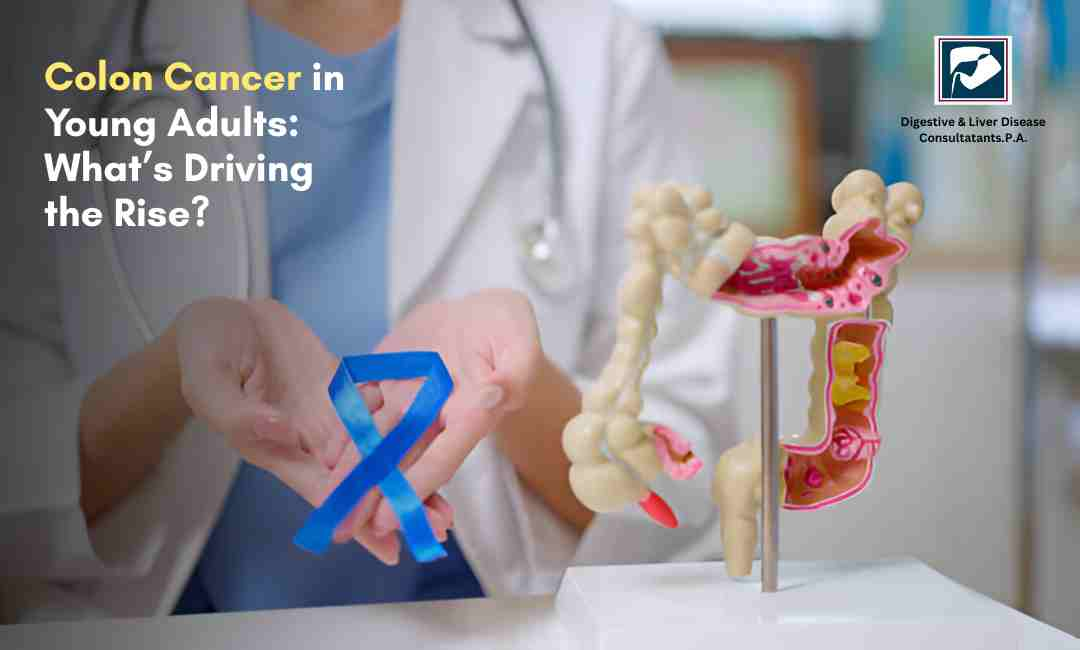Colon cancer, also known as colorectal cancer, was once thought to be a disease that primarily affected older adults. However, recent research and medical reports in the United States have revealed a worrying trend — an increasing number of young adults are being diagnosed with colon cancer. This shift has raised urgent questions among doctors, researchers, and public health experts: Why is this happening, and what can we do about it?
In this blog, we’ll explore the possible reasons behind this rise, the warning signs to watch for, and how timely diagnosis and treatment can make a difference. We will also highlight how the specialists at Digestive & Liver Disease Consultants, P.A. can help you protect your digestive health.
A Growing Concern in the U.S.
For decades, colon cancer screening guidelines were designed with older adults in mind, typically recommending routine screenings starting at age 50. But in the past two decades, studies have shown a steady increase in cases among adults under 50. In fact, the American Cancer Society now recommends beginning screening at age 45, and in some cases even earlier if there is a family history or other risk factors.
This rising trend is alarming because young patients are often diagnosed at more advanced stages. This is partly due to a lack of awareness — both patients and healthcare providers may not suspect colon cancer in someone so young, leading to delayed diagnosis.

Possible Causes Behind the Rise
Researchers are still studying the exact reasons why colon cancer rates are climbing in younger adults, but several factors are believed to play a role:
1. Diet and lifestyle changes
Modern diets high in processed foods, red meat, and sugary drinks, combined with low intake of fiber, fruits, and vegetables, may contribute to increased risk. Unhealthy eating habits can lead to inflammation in the digestive tract and changes in gut bacteria that promote cancer growth.
2. Sedentary lifestyle
Physical inactivity is linked to a higher risk of colon cancer. Many young adults spend long hours sitting at desks or using electronic devices, leading to reduced activity levels.
3. Rising obesity rates
Obesity is a known risk factor for colon cancer. Higher body fat can cause chronic inflammation and hormonal imbalances that promote cancer cell growth.
4. Gut microbiome changes
The gut microbiome — the community of bacteria in our intestines — plays a major role in digestion and immune health. Disruption of this balance due to diet, antibiotics, or environmental factors may increase cancer risk.
5. Family history and genetics
Hereditary syndromes such as Lynch syndrome and familial adenomatous polyposis (FAP) can significantly increase the risk of colon cancer, even at a young age. People with a family history should discuss early screening with their doctor.
Early Signs and Symptoms to Watch For
Colon cancer in its early stages may not cause noticeable symptoms. However, there are warning signs that should never be ignored, regardless of your age:
- Persistent changes in bowel habits, such as diarrhea or constipation
- Blood in the stool or rectal bleeding
- Unexplained weight loss
- Abdominal pain, cramping, or bloating
- Fatigue or weakness
- A feeling that your bowel does not empty completely
If you experience any of these symptoms, especially if they persist for more than a couple of weeks, consult a gastrointestinal (GI) specialist promptly.
The Importance of Early Screening
Early detection is the key to successful treatment. Colonoscopies remain the gold standard for detecting colon cancer and precancerous polyps. Other non-invasive tests, such as stool-based screening, can also be helpful, but colonoscopy allows for both detection and removal of polyps during the same procedure.
Given the growing incidence in younger adults, it is essential to follow updated screening guidelines and talk to your doctor about your personal risk factors.
Treatment Options for Colon Cancer
Treatment depends on the stage of the cancer, but may include:
- Surgery to remove the tumor and surrounding tissue
- Chemotherapy to kill cancer cells and prevent recurrence
- Radiation therapy for certain cases, especially rectal cancer
- Targeted therapy and immunotherapy for advanced or specific genetic types of cancer
Young patients often face unique challenges, including concerns about fertility, career, and family responsibilities. This makes personalized care and emotional support crucial during treatment.
How Digestive & Liver Disease Consultants, P.A. Can Help
At Digestive & Liver Disease Consultants, P.A., our team of experienced gastroenterologists provides advanced diagnostic, treatment, and preventive care for all digestive health concerns, including colon cancer. We use state-of-the-art technology for accurate colonoscopies, polyp removal, and cancer detection.
Our approach focuses on:
- Personalized screening plans based on your risk factors
- Comprehensive evaluation for any digestive symptoms
- Patient education to empower you in making informed health decisions
- Coordinated care with oncologists and surgeons when necessary
We are committed to providing compassionate, expert care to help our patients live healthier, longer lives.
Preventing Colon Cancer in Young Adults
While some risk factors like genetics cannot be changed, lifestyle modifications can significantly reduce your risk:
- Eat a balanced diet rich in fiber, fruits, vegetables, and whole grains
- Limit red meat and processed meats
- Stay physically active and maintain a healthy weight
- Avoid smoking and limit alcohol consumption
- Get regular screenings based on your doctor’s advice
Conclusion
The rise in colon cancer among young adults in the United States is a serious public health issue. Understanding the risk factors, recognizing symptoms early, and getting timely screenings can save lives.
At Digestive & Liver Disease Consultants, P.A., our expert gastroenterologists are here to guide you through preventive care, early detection, and advanced treatment options for colon cancer. Your digestive health matters — schedule your appointment today and take the first step toward protecting it.






